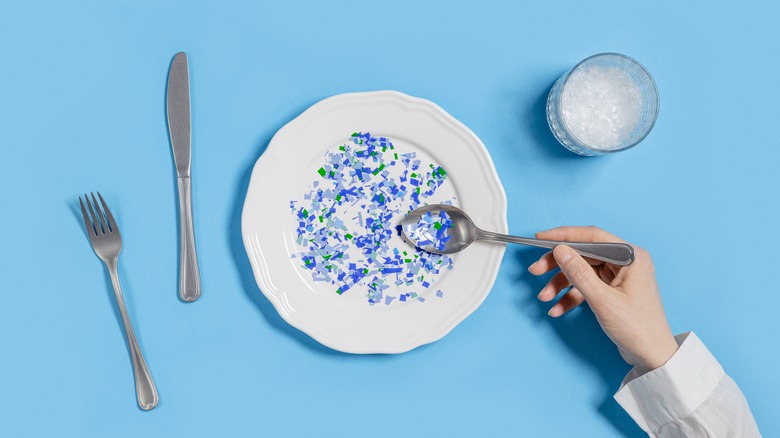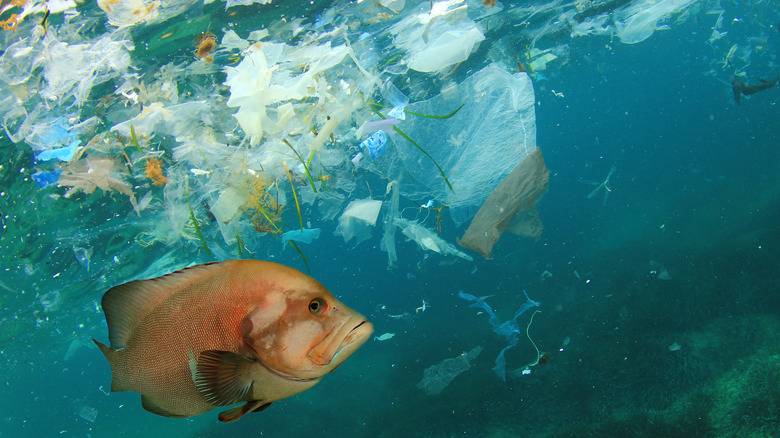You Probably Eat A Credit Card's Worth Of Plastic Every Week
Although there's a good chance you've heard of microplastics — tiny plastic particles produced from the deterioration of larger pieces of plastic or during the creation of commercial products, per National Geographic — the amount of these microscopic plastics you're consuming on a weekly basis may shock you.
In a 2019 report by the World Wildlife Fund, titled "Assessing Plastic Ingestion From Nature to People," researchers at The University of Newcastle revealed that the average person is inadvertently consuming far more plastic than previously anticipated. The prevalence of microplastics (which can measure up to 0.2 inches in length, according to National Geographic) has boomed throughout the 21st century due to the increase in global plastic production. According to WWF, the amount of plastic produced from 2000 to 2019 was equal to the sum total of plastic created in all previous years combined.
Research has indicated that humans consume microplastics both through inhalation and the ingestion of food, dust, and beverages (via Frontiers). Microplastics have been detected in a wide variety of products, from plastic bottles and paper cups to raw meat and seafood. One eye-opening study by the Vrije Universiteit Amsterdam (VUA) linking meat and microplastics found that 75% of beef and pork products and 72% of milk products in a random testing group were found to contain some trace amounts of plastic, likely due to the high amount of microplastics contained in animal feed pellets (via The Guardian).
Microplastics are prevalent in both meat and fish
Another recent study of the prevalence of microplastics in New Zealand's marine life found that around 75% of the country's fish contained the small plastic particles, illustrating that animals on land and at sea are equally vulnerable to plastic pollution (via The Guardian). Although it's clear that microplastics are prevalent throughout the global food supply, the extent to which the average person is consuming plastic may still come as a surprise.
The University of Newcastle study, which was commissioned by WWF, found that the average person consumes around 2000 tiny pieces of plastic each week, or about 5 grams, which equates to the weight of the average credit card. Researchers compiled data from over 50 microplastic studies to determine the average quantity of the tiny plastics found in food and drink staples like water, fish, sugar, beer, and salt.
"While the awareness of microplastics and their impact on the environment is increasing, this study has helped to provide an accurate calculation of ingestion rates for the first time," said Dr. Thava Palanisami, one of the lead researchers on the 2019 study. "Developing a method for transforming counts of microplastic particles into masses will help determine the potential toxicological risks for humans moving forward."
Microplastics are getting into people's blood
Recent research has suggested that this high level of consumption has likely had a direct impact on vital bodily organs. Earlier this year, a scientific study conducted by researchers at Vrije Universiteit Amsterdam (VUA) revealed microplastics were detected in the blood of nearly 80% of study participants. Although the initial test group included just 22 healthy adults, the findings pointed to a potentially staggering public health issue on a larger scale.
Researchers found that half of the study participants' blood contained trace amounts of PET plastic, the variety most frequently used in plastic beverage bottles. A quarter of participants had trace amounts of polyethylene, which is used to make plastic bags, in their blood, while a third of participants' blood contained polystyrene, a plastic used in food packaging and other products (via The Guardian).
The Vrije University data confirmed a suspicion long held by scientists focused on the ubiquity of the microscopic plastics: Once consumed, the particles can be transported throughout the body, absorbed by organs, and potentially even damage human cells.
"These findings must serve as a wake-up call to governments," said Marco Lambertini, Director General of WWF, in a press release. "Not only are plastics polluting our oceans and waterways and killing marine life — it's in all of us and we can't escape consuming plastics. ... If we don't want plastic in our bodies, we need to stop the millions of tons of plastic that continue leaking into nature every year."


